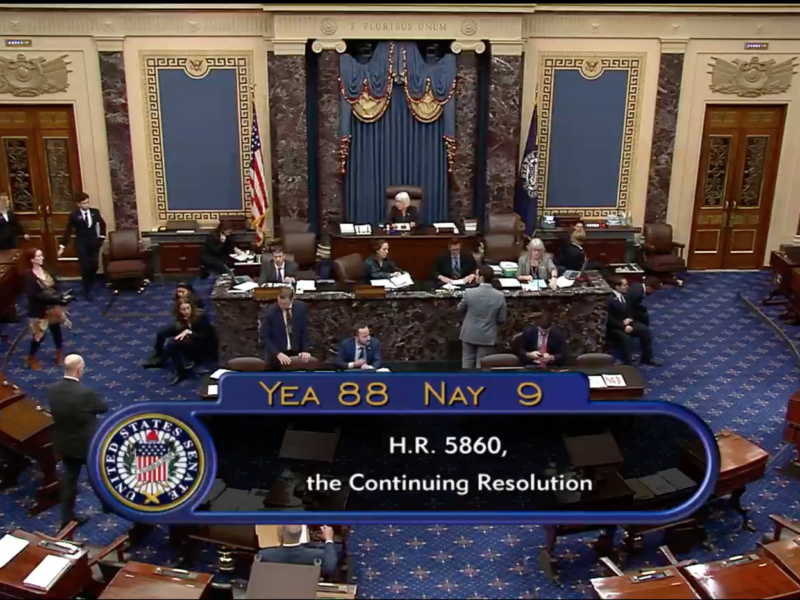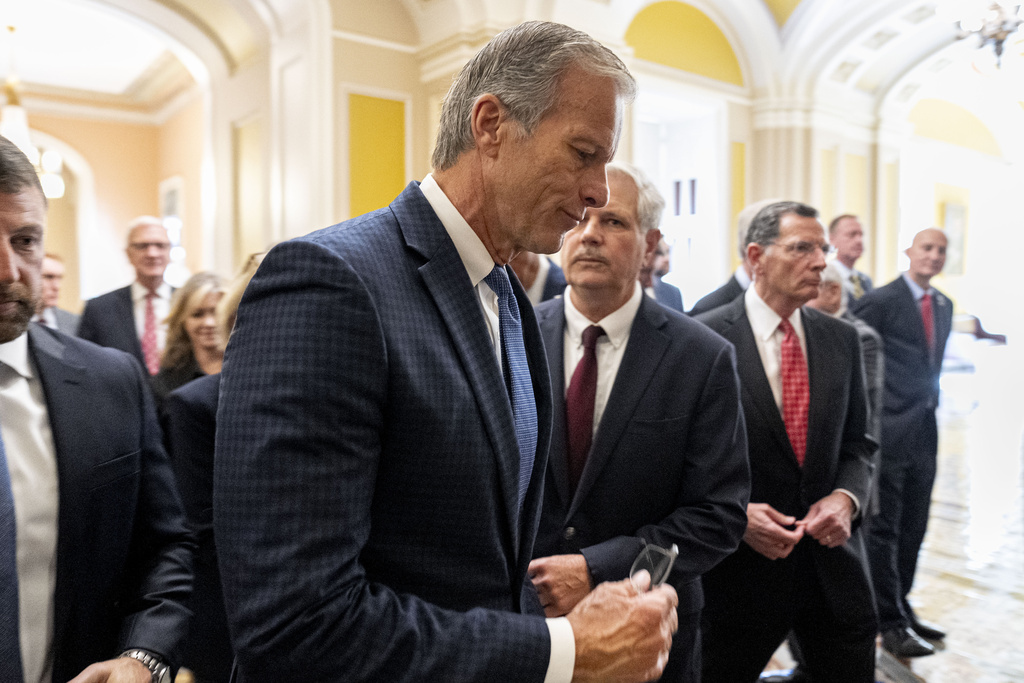Congress Funds Government for 45 More Days; Wyoming Leaders Split
Wyoming Sens. Barrasso, Lummis supported the short-term extension while Rep. Hageman opposed
- Published In: Politics
- Last Updated: Oct 01, 2023

By Jacob Gardenswartz
Special to the Wyoming Truth
WASHINGTON — Lawmakers in Washington voted to temporarily fund the U.S. government on Saturday, averting a possible shutdown mere hours before key federal coffers were set to run out.
The decision to bring a 45-day continuing resolution (CR) up for a vote on the House floor marked an explicit reversal from Speaker Kevin McCarthy (R-Calif.)’s position as recently as Saturday morning, when he told his conference behind closed doors that Republicans lacked the votes to move forward with any short-term stopgap measure.
But under fire from moderate members of his party worried about being blamed for the shutdown — and increasingly critical language from Republicans in the Senate — McCarthy ultimately caved. He moved a bill to extend government funding at its current levels through mid-November paired with an additional $18 billion in disaster relief funds.
“After exhausting everything else, this Speaker understands that shutting the government down is not an option,” House Majority Whip Tom Emmer (R-Minn.) told reporters at a post-vote press conference. “If you’re a fiscal conservative, you do not want the government to shut down, because you are going to pay a whole lot more.”
In the House, all but one Democrat supported the measure while 90 Republicans opposed it, bringing the final vote tally to 335–91. Wyoming Rep. Harriet Hageman was among the GOP holdouts.

“Even if only for 45 days, this is far more spending than I can support,” she said in a statement after her “no” vote. Hageman said a bill brought Friday evening, which would have significantly cut funding levels and included more stringent border security measures, “should have passed and that was the bill I supported”; that measure was ultimately voted down by other House conservatives who joined with Democrats and tank it. The GOP opponents argued it still amounted to too much government spending.
Saturday’s House vote took place as Senators were still debating their own version of a stopgap measure, nearly identical to the House version, but with the addition of $6 billion in aid to Ukraine.
Senate Republicans and Democrats alike expressed frustration with McCarthy’s removal of that funding — prompting Sen. Michael Bennett (D-Colo.) to delay a vote on the stopgap measure until he received assurances a Ukraine aid package would be brought up for a vote later on.
“Most Senate Republicans remain committed to helping our friends on the front lines [in Ukraine], through investing more heavily in American strength,” McConnell later said in remarks on the floor. “I’m confident the Senate will pass further urgent assistance to Ukraine later this year.”
His sentiments were echoed in statements by the House and Senate Democratic leaders Saturday evening. McCarthy, meanwhile, has made no such promise.
Shortly after 9 p.m. Eastern, the upper chamber passed the 45-day extension on a bipartisan basis with a vote of 88-9, fewer than three hours before the shutdown was set to commence.
BothWyoming Sens. John Barrasso and Cynthia Lummis backed the measure, though Lummis had opposed similar ones earlier in the week. In a post-vote statement, Lummis said she supported the extension “to ensure our service men and women continue getting a paycheck, our national parks… remain open and federal services that people in Wyoming rely on remain open as Congress continues work on appropriations bills.”
“During the next 45 days I will do everything in my power to push Congress to use this opportunity to get our fiscal house in order, cut spending to stop the out-of-control inflation harming the people of Wyoming and secure our southern border,” her statement concluded.
Barrasso, who had also supported the previous stopgap measure the Senate considered, said after the vote that averting the shutdown was “the right thing to do for Wyoming.”
President Joe Biden was expected to sign the bill Saturday evening, ensuring government appropriations would extend through Nov. 17. “This is good news for the American people,” he said in a statement after the measure passed.
A short-term extension with long-term problems
The vote to approve a 45-day extension may have staved off a funding lapse in the short-term. But the political dynamics which brought the country so close to the brink of a shutdown persist — raising the possibility, if not the likelihood, that the same situation may befall Congress in mid-November.
Upon his election as Speaker, McCarthy publicly pledged to restore the House to a “regular order” appropriations process, replacing large multi-agency spending packages which had become common in recent decades with individual funding bills for each of the 12 agencies or groupings.
The House has passed four such bills with almost exclusively GOP support so far. Eight remain, one of which — Department of Agriculture appropriations — saw public failure on the floor just this week. Some Republicans from rural districts opposed the steep cuts included in the bill, while others took issue with language banning the sale of abortion medications being sold by mail.
Those measures that have passed — appropriations for the Departments of State, Defense and Homeland Security as well as military construction — are chock-full of Republican policy priorities and deep cuts that have no chance of clearing the Democratically-controlled Senate or becoming law. And in passing the CR, McCarthy moved a measure to the floor less than half an hour after the text was released, breaking a previous promise to allow lawmakers at least 72 hours to review bills before they voted on them.
So while lawmakers have bought themselves a month and a half until the government shuts down, significant challenges remain to ensuring it stays open beyond that.
And the path forward on Ukraine funding is still murky. Even if the Senate manages to pass a standalone budget measure providing further support, there remains significant doubt whether it could win enough GOP votes in the House to pass, as evidenced by House Republicans’ decision to strip funding from the short-term measure on Saturday.
On that point, former Rep. Liz Cheney (R-Wyo.) weighed in, suggesting in a post on X, the site formerly known as Twitter, that those opposed to sending Ukraine more aid “should read some history” about the start of World War II.
“Appeasement didn’t work then,” Cheney wrote Saturday night. “It won’t work now.”













